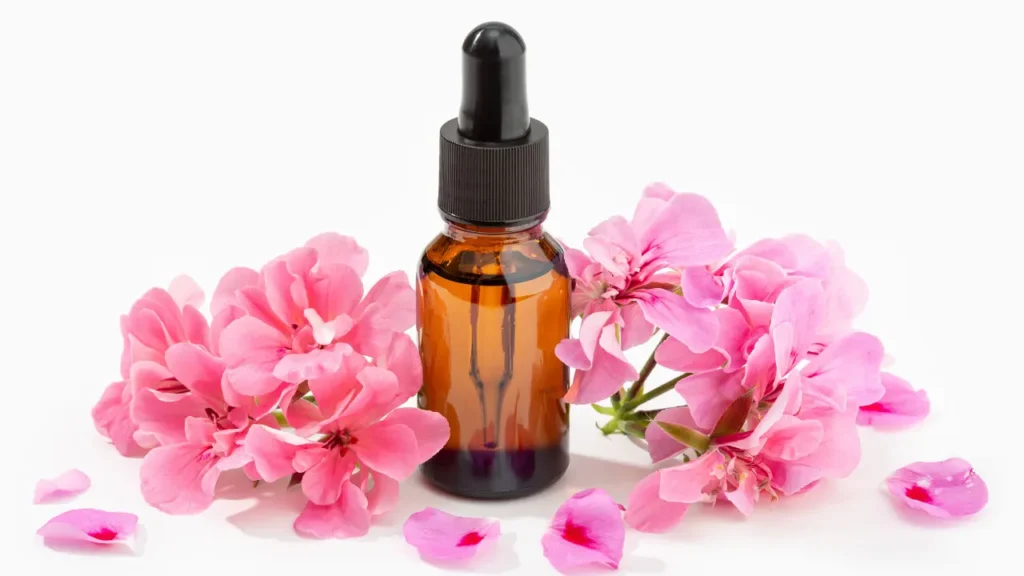Geranium robertianum, also known as spotted geranium, has gained attention in the nootropic supplement industry. This perennial plant, which is native to Europe, Asia, and North America, is known for its vivid blossoms and distinctive scent. Beyond its visual attractiveness, spotted geranium is becoming more and more known for its therapeutic qualities, especially in the area of cognitive improvement. This article explores the chemistry, potential drug interactions, health advantages, best dosage, adverse effects, and responsible usage of spotted geranium.
You May Also Like:
Dr Emil Nutrition Lion’s Mane Reviewed: A Leading Nootropic Mushroom Product
Spotted Geranium: Benefits, Dosage, Side Effects, Drug Interactions, and Other Important Information is an original (NootropicsPlanet) article.
Nature of Spotted Geranium
Spotted geranium is a perennial herbaceous plant that is indigenous to North America, Europe, and Asia. This plant, which is commonly found in woodlands, hedgerows, and rocky regions, is distinguished by its deeply lobed leaves and brilliant pink to purple blooms. It thrives in gloomy, damp conditions. The plant usually reaches a height of 30 to 50 cm, and when its leaves are crushed, they release a potent, characteristic odor that has led to its usage in traditional herbal medicines. Because of its resilience and ability to adapt to various habitats, it can be found in lots of places around the world.
Its seasonal blooming, from spring to fall, not only adds aesthetic value to its surroundings but also attracts a variety of pollinators, contributing to the ecological balance of its habitat. The plant’s traditional use in herbal medicine and recent interest in its nootropic properties highlight its multifunctional nature and potential benefits to human health.
Health Benefits of Spotted Geranium
Spotted geranium has a variety of physiological effects that support general well-being in addition to its ability to improve cognition. The main source of these advantages is the abundance of bioactive substances found in it, including flavonoids, tannins, saponins, and other phytonutrients. Here, we go into great detail on the health advantages of spotted geranium and examine its effects on a range of human health issues.
Enhancement of Brain Function and Cognitive Performance
The way that spotted geranium improves brain function and cognitive performance is primarily due to its effects on neurotransmitter systems, including acetylcholine, which is essential for memory, learning, and focus. Spotted geranium may raise the levels of cholinergic neurotransmitters and improve cognitive functioning by blocking acetylcholinesterase, the enzyme that breaks down acetylcholine. In addition, the plant’s high flavonoid content protects neurons from oxidative stress and enhances cerebral blood flow, which is one of its neuroprotective benefits. Together, these systems promote brain health and cognitive functions. This comprehensive strategy highlights the benefits of spotted geranium as a nootropic, providing a safe and all-natural way to support cognitive function and brain health.
Antioxidant and Anti-inflammatory Effects
One of the most important health benefits of spotted geranium is its strong antioxidant capacity. Flavonoids and other chemicals found in the plant, such as kaempferol and quercetin are strong free radical scavengers. Spotted geranium helps shield cells from oxidative stress which can lead to chronic illnesses including diabetes, cardiovascular disease, and neurological diseases like Alzheimer’s disease, by neutralizing these unstable chemicals. Moreover, the anti-inflammatory properties of tannins and saponins in spotted geranium help to lessen inflammation. These qualities can be especially helpful in the treatment of inflammatory illnesses such as arthritis.
Antimicrobial Activity
Scientific research has confirmed the antibacterial capabilities of spotted geranium, which have been acknowledged in traditional medicine. The plant’s tannins and other phytochemicals have antibacterial and antifungal properties that make them useful against a variety of microbes. Spotted geranium is an effective natural cure for infections and wound healing because of its antibacterial properties. It is used in traditional medicine to treat small wounds, skin infections, and even pathogen-induced gastrointestinal disorders.
Support for Digestive Health
Traditionally, spotted geranium has been used to promote intestinal health. Due to its high tannin content, it has astringent qualities that can aid in the treatment of diarrhea and gastrointestinal distress. In situations of gastroenteritis or irritable bowel syndrome (IBS), the astringent impact causes the mucous membranes to contract, reducing irritation and secretion. Additionally, spotted geranium’s antibacterial properties may help maintain gut flora balance, which enhances digestive health.
Cardiovascular Health
Although there hasn’t been much direct research on the impact of spotted geranium on cardiovascular health, the plant’s anti-inflammatory and antioxidant qualities point to possible advantages. Cardiovascular disorders, including atherosclerosis and hypertension, are largely influenced by oxidative stress and inflammation. Spotted geranium may aid in the prevention of cardiovascular illnesses by reducing oxidative stress and inflammation. It is also possible that spotted geranium increases cardiovascular blood flow, which helps maintain the heart’s health.
Skin Health
The antimicrobial and anti-inflammatory properties of spotted geranium are also beneficial for skin health. Traditional uses of the plant include treating skin conditions such as eczema, acne, and minor wounds. The antioxidant components can help protect the skin from damage caused by environmental factors, promoting skin regeneration and preventing signs of aging.
Immunomodulatory Effects
Emerging evidence suggests that spotted geranium may have immunomodulatory effects, potentially enhancing the body’s immune response. While detailed mechanisms are still under investigation, the plant’s ability to modulate inflammation and its antimicrobial properties are likely contributors to its positive impact on the immune system.
The intricate phytochemical composition of spotted geranium is responsible for a wide range of health benefits. Spotted geranium provides a multimodal approach to improving well-being, ranging from its antibacterial activity and support for digestive and cardiovascular health to its antioxidant and anti-inflammatory properties. Its historical application and the increasing amount of scientific studies will help demonstrate its efficacy in fostering wellness and averting illness.

Chemistry of Spotted Geranium
The chemical composition of spotted geranium (Geranium robertianum) is rich and diverse, underpinning its therapeutic potential. There are several key groups of bioactive compounds that are central to the nootropic and health-promoting effects:
- Tannins: These are polyphenolic compounds known for their astringent properties and ability to precipitate proteins. Tannins from spotted geranium have been shown to possess antioxidative and antimicrobial properties.
- Flavonoids: Flavonoids are a wide-ranging class of phytonutrients found in plants. Flavonoids contribute to the color of the plant and are potent antioxidants that have been linked to brain health by protecting neurons against oxidative stress, modulating neurotransmission, and promoting cerebral blood flow. The flavonoids in spotted geranium, such as quercetin and kaempferol, are particularly noted for their neuroprotective and anti-inflammatory effects.
- Saponins: These are glycosides with a distinctive foaming characteristic. Saponins exhibit a range of biological activities, including anti-inflammatory and immune-modulatory effects. Their role in spotted geranium’s effects on cognition is less direct but may contribute to the overall health benefits and enhanced resilience against neurological stress.
- Geraniin: A specific compound found in spotted geranium, geraniin, has been identified for its antioxidant properties. Although its direct role in cognitive enhancement is not fully established, the antioxidative capacity of geraniin can contribute to neural protection and potentially aid cognitive functions by reducing oxidative stress within the brain.
This complex array of phytochemicals in spotted geranium contributes to its multifaceted therapeutic potential, influencing various biological pathways and systems. The antioxidant and anti-inflammatory properties of these compounds are particularly significant for cognitive health, given the critical roles of oxidative stress and inflammation in cognitive decline.
Physiological Mechanism of Action of Spotted Geranium
The principal mechanism of spotted geranium entails the regulation of acetylcholine, a crucial neurotransmitter linked to memory and learning. Spotted geranium may increase the availability of acetylcholine by blocking acetylcholinesterase, the enzyme that breaks down acetylcholine in the synaptic cleft. This will lead to improved synapse efficiency which may increase cognitive abilities like memory, focus, and awareness.
Furthermore, spotted geranium’s flavonoids have a reputation for eliminating oxidative stress and scavenging free radicals, two conditions that can cause brain injury and cognitive decline. Flavonoids support neuronal integrity, which is essential for cognitive functions by shielding neurons from oxidative stress. Furthermore, by ensuring that the brain tissues receive enough oxygen and nutrients, these substances may enhance cerebral blood flow, which would further promote cognitive functioning.
The comprehensive effects of spotted geranium on brain health and cognitive performance result from these intricate connections within the central nervous system. Its ability as a nootropic supplement is facilitated by both the antioxidative properties of its phytochemicals and the inhibition of acetylcholinesterase. Spotted geranium is positioned as a promising supplement for cognitive health and resilience because of its dual action, which improves cognitive functioning in the short term while also potentially providing long-term preventive advantages against cognitive decline.

Optimal Dosage of Spotted Geranium
Figuring out the best dosage of spotted geranium for cognitive improvement is difficult because there is a significant lack of clinical research. Anecdotal evidence and preliminary study point to a wide range of beneficial dosages, the most popular of which is between 200 and 600 mg of extract per day. Nonetheless, you must speak with healthcare professionals to customize the dosage to your unique requirements and medical situations.
Side Effects of Spotted Geranium
While most adults are thought to be safe using spotted geranium, it is important to be aware of any possible negative effects. Spotted geranium may cause nausea, dizziness, and gastrointestinal discomfort, especially at larger dosages. To prevent negative reactions, people with pre-existing medical issues or those on specific medications should take extra care.
Potential Substance Interactions with Spotted Geranium
When taking spotted geranium as a nootropic supplement, people should take other substances’ interactions into account. There may be interactions with medications that alter neurotransmitter levels, such as antidepressants and anticholinergic drugs. Its blood-thinning qualities may also interact with anticoagulant drugs. Therefore, careful consideration of the advantages and disadvantages is required for these situations.

Best Responsible Use of Spotted Geranium
There are a few important factors to take into account while using spotted geranium as a nootropic responsibly. Starting at the lowest dose that is safe, people should progressively increase it to determine their tolerance and response. Consultation with healthcare providers and regular monitoring of effects and side effects are crucial, especially if you are taking any medications or have any pre-existing disorders. In addition, it is recommended to take periodic breaks from supplement use to reduce potential dangers because long-term safety data are lacking.
Spotted Geranium:
Conclusion
Spotted geranium is gaining popularity as a nootropic supplement because of its potential to improve cognitive function. This plant is a perennial plant native to Europe, Asia, and North America. Aside from its alleged brain-improving ability that stems from the strong antioxidant and anti-inflammatory properties of the plant, spotted geranium is also good for digestive health, cardiovascular, and skin health. This supplement is suited for those who are looking to relieve IBS symptoms or improve heart health aside from advancing thinking skills.
The plant contains many bioactive substances that contribute to the aforementioned health benefits. If you are interested in taking this supplement, you must seek advice from your doctor to prevent any unwanted side effects. The dosage for this supplement is very difficult to determine and hence professional medical advice is always highly recommended.

References:
- Spotted Geranium – Uses, Side Effects, and More. Retrieved from:https://www.webmd.com/vitamins/ai/ingredientmono-1244/spotted-geraniumComparative Evaluation of Phenolic Profile, Antioxidative and Cytotoxic Activities of Different Geranium Species. Retrieved from: https://www.ncbi.nlm.nih.gov/pmc/articles/PMC5963659/
- Herb Robert’s Gift against Human Diseases: Anticancer and Antimicrobial Activity of Geranium robertianum L.. Retrieved from:https://www.ncbi.nlm.nih.gov/pmc/articles/PMC10223082/
Important Note: The information contained in this article is for general informational purposes only, and should not be construed as health or medical advice, nor is it intended to diagnose, prevent, treat, or cure any disease or health condition. Before embarking on any diet, fitness regimen, or program of nutritional supplementation, it is advisable to consult your healthcare professional in order to determine its safety and probable efficacy in terms of your individual state of health.
Regarding Nutritional Supplements Or Other Non-Prescription Health Products: If any nutritional supplements or other non-prescription health products are mentioned in the foregoing article, any claims or statements made about them have not been evaluated by the U.S. Food and Drug Administration, and such nutritional supplements or other health products are not intended to diagnose, treat, cure, or prevent any disease.


